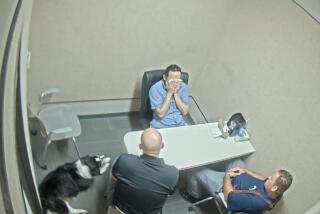The Mysterious Case of Mr. R
- Share via
Conflicts involving insurance often bog down in the details. There is so much fine print, so much miscommunication, that disputes often last for a very long time. Sometimes, they are real dillies.
This story began with a simple rear-ender July 8 on the Ventura Freeway. No one was injured. Each of the cars involved suffered several thousand dollars in damage.
But here we are, four months later, and the dispute has grown like Topsy. One question is whether the party at fault had a liability policy, as required by state law, in effect at the time. If not, the ramifications of this Valley “fender bender” reach all the way to Sacramento and raise questions about how the state’s mandatory insurance law is observed.
The victim in this accident was David Khoo, a Westlake Village resident. The man held in the police report to be “at fault for this collision and in violation of 22350 Vehicle Code (unsafe speed for conditions),” is a Culver City resident who will be referred to in this article as Mr. R.
That is his correct last initial. His full name is not included here, because early in my inquiry, in exchange for Mr. R discussing with me his understanding of the matter, I agreed not to use his full name. He explained he was caught up in the circumstances and wanted to avoid embarrassment.
David Khoo has been represented in the accident follow-up by his father, E.C. Khoo, an attorney who has been extremely active trying to collect his son’s damages. E.C. Khoo reached me, saying this was a most peculiar case because the party at fault in the accident had been compensated for his own $7,000 collision damage by one insurance company, but a second company, carrying Mr. R’s liability coverage, Topa Insurance Co., was refusing to pay any liability damage to David Khoo.
On Aug. 17, indeed, Topa sent a letter to David Khoo saying, “Our investigation in regards to the coverage issue has been completed. Our insured’s policy was not in force at the time of this loss. Therefore, we will not be able to make payment on this loss.”
Khoo had to go to his own insurer, Superior, for compensation, and, after the deductible, it paid all but $1,050 of his loss.
But in the meantime, Khoo’s father pursued Mr. R to pay the $1,050 and threatened to sue him. He also pointed out that Mr. R was in violation of the state’s mandatory insurance law if he did not have liability coverage in force at the time of the accident.
I contacted Mr. R., who after securing my agreement not to use his full name, said he still believed he had been covered for liability at the time of the accident.
“I called up Topa, and I have a fax from them saying that my policy had not lapsed,” Mr. R said. I requested a copy, but he said he could not find the fax.
“I’d like to see David Khoo paid, and it not come out of my pocket,” Mr. R said.
Meanwhile, he added, since he paid both of his insurance companies through a bank, he has asked it for its records of when Topa was actually paid.
I went to Topa for comment. In a letter to me Monday, James E. Kalupa, vice president for claims, declared, “Our file indicates that we had received and honored a request to cancel the policy effective prior to the date of loss . . .
“Your inquiries prompted another review of this entire matter and we remain confident that the Topa liability policy was not in force on the date of the accident,” he said.
Kalupa added, “We do not believe that we can provide any further details without violating our insured’s privacy rights,” and in a telephone conversation he declined to get into whether a Topa representative had ever told Mr. R that his policy had not lapsed.
Another call to Mr. R found him now acknowledging that Topa had told him later on that his liability policy indeed had lapsed and had only been reinstated the day after the accident.
“I’m trying to track down where the fault for this lies, whether this was a faulty customer service,” Mr. R said.
While denying he had ever ordered the policy terminated, he reiterated at this point that he is not ready to recognize that he didn’t have a policy on the day of the accident. “I need to track down a lot of paperwork to find where the fault lies,” he said.
In the meantime, Mr. R said he has never notified the Department of Motor Vehicles that there are questions of his violating the mandatory insurance law, because he was not sure he did violate it.
By back-checking the police report, a DMV spokesman said the department now knew who Mr. R was and could find no record of his ever even filing an SR-1, a personal accident report, as required by law within 10 days in any accident causing more than $500 damage. Not filing is a misdemeanor violation.
DMV spokesman Evan Nossoff noted the required report contains insurance information “and if those reporting do not have insurance, their licenses are suspended for up to a year and they must show proof of insurance for three years.”
There is also a perjury provision, Nossoff said. But, of course, Mr. R takes the position that the reason he hasn’t reported not having insurance is that he has never become convinced that he didn’t.
I ran this by the state Department of Insurance, where Tim Hart, the senior legislative counsel, said the case seemed to him “a gray area in which scofflaws reside.” But Mr. R insists he is not a scofflaw.
Indeed, he said, two weeks ago he offered David Khoo a settlement, under which he would pay the $1,050 in costs not reimbursed by Khoo’s insurance company in exchange for a signed release.
Negotiations on the possible settlement are proceeding, both sides said. But even if it is settled between the parties, there may now have to be official action taken as well.
*
Ken Reich can be contacted with your accounts of true consumer adventures at (213) 237-7060, or by e-mail at ken.reich@latimes.com.
More to Read
Sign up for Essential California
The most important California stories and recommendations in your inbox every morning.
You may occasionally receive promotional content from the Los Angeles Times.













